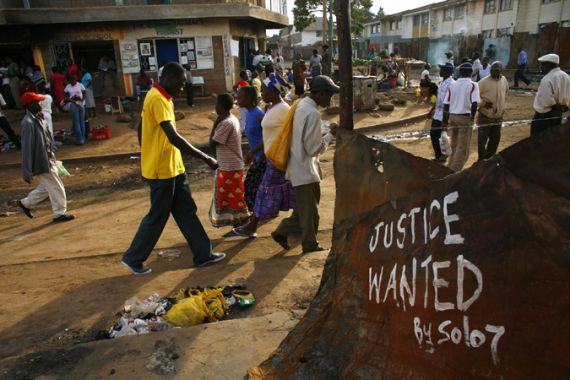
Can the ICC deliver justice to Kenyans?
As the court charges officials over the 2007 election violence, we ask if this signals the end of a culture of impunity.
The International Criminal Court (ICC) has confirmed that it will bring to trial four of six Kenyan officials accused of directing the violence that followed the disputed 2007 elections.
|
“The credit cannot and should not go to the so-called ICC. What has happened is homegrown, the realisation of how badly we had behaved is paramount in the [Kenyan] people’s minds …. There is no way Kenyan people, including all the victims, some of whom are not even represented in the current process, will ever get any remedy or even justice by the prosecution of merely four people.” – Kiriro Wa Ngugi, a Kenyan affairs analyst |
The court said there was sufficient evidence to put the four men on trial for their roles in the country’s bloody post-election violence, which served to further underline the country’s deep ethnic divisions.
The violence began when clashes broke out between supporters of two rival presidential candidates, Raila Odinga and Mwai Kibaki. More than 1,200 people were killed and about 600,000 were forced to flee their homes.
Uhuru Kenyatta, the deputy prime minister and son of Kenya’s first president, is among those who have been indicted by the ICC.
Both sides denied the charges and argued that there is no evidence connecting them to these crimes.
Kibaki was eventually declared the winner of the election, and is serving his second term as president, while Odinga is the current prime minister.
Initially, six Kenyans were under investigation for organising the violence that followed the 2007 elections. Below are the details of who they are and the charges against them.
|
On this episode of Inside Story we ask: Will the ICC trials put an end to decades of impunity in Kenya for political violence? And will winners emerge from this ICC process?
To discuss this we are joined by: Kiriro Wa Ngugi, a Kenyan affairs analyst; William Schabas, a professor of law at Middlesex University; and Mohammed Adow, Al Jazeera’s correspondent in Nairobi.
|
ICC TRIAL FACTS
|